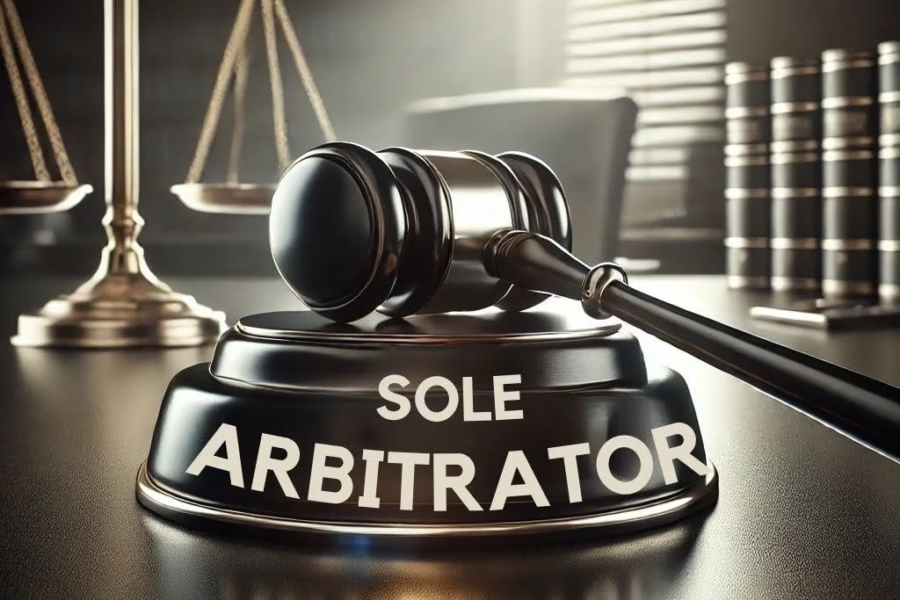Arbitration has emerged as a preferred method of dispute resolution due to its efficiency, privacy, and party autonomy. A key component of arbitration is the appointment of an arbitrator or arbitral tribunal. One of the most debated aspects of this process is the appointment of a sole arbitrator—particularly when appointed unilaterally by one party. This article explores the constitutionality, statutory validity, and judicial interpretation surrounding the appointment of a sole arbitrator.
Legal Framework in India
Arbitration and Conciliation Act, 1996
The governing statute for arbitration in India is the Arbitration and Conciliation Act, 1996, which is based on the UNCITRAL Model Law.
Key Provisions Relevant to Sole Arbitrator:
- Section 10: Number of arbitrators – allows the parties to determine the number of arbitrators, provided it is not an even number.
- Section 11: Appointment of arbitrators – provides procedures for appointment and default mechanism when parties fail to appoint.
- Section 12: Grounds for challenge – emphasizes impartiality and independence of arbitrators.
- Schedule V & VII: Specifies circumstances that give rise to justifiable doubts as to an arbitrator’s independence or impartiality.
Sole Arbitrator and Unilateral Appointment
What is a Sole Arbitrator?
A sole arbitrator is a single individual appointed to resolve the dispute between parties in contrast to a panel or tribunal comprising multiple arbitrators.
Issue with Unilateral Appointment
The most controversial practice is when one party (usually stronger, like an employer or corporation) unilaterally appoints the arbitrator without equal participation from the other side. This raises questions of bias, fairness, and natural justice under Article 14 of the Constitution of India (right to equality).
Constitutional Dimensions
Article 14 – Equality Before Law
The unilateral appointment of a sole arbitrator can be seen as violative of Article 14, as it gives one party disproportionate control over the dispute resolution mechanism.
Doctrine of Natural Justice
Two principles apply:
- Nemo Judex In Causa Sua – No one should be a judge in their cause.
- Audi Alteram Partem – Right to a fair hearing.
Both can be compromised if one party controls the appointment of the arbitrator.
Case Laws
The judiciary has consistently scrutinized and, in several instances, invalidated the unilateral appointment of sole arbitrators due to concerns about impartiality and fairness. Such appointments often raise questions about the independence of the arbitration process, especially when one party has the exclusive right to select the arbitrator. Below are notable cases where courts have provided reasoning against the selection of sole arbitrators:
In the case Perkins Eastman Architects DPC v. HSCC (India) Ltd. (2019), the Supreme Court held that allowing a person with a vested interest in the dispute’s outcome to appoint the arbitrator compromised the neutrality of the arbitration process. The Court emphasized that such unilateral appointments violate the principles of impartiality and independence, rendering the appointment invalid.
In the case, Union of India v. M/s. M. V. Omni Projects (India) Ltd. (2024), The Union of India had unilaterally appointed a sole arbitrator without the consent of the other party. The Delhi High Court ruled that such an appointment violated Section 12(5) of the Arbitration and Conciliation Act, 1996, which mandates the independence and impartiality of arbitrators. The Court had nullified and set aside an award passed by an appointed arbitrator.
The Gujarat High Court quashed the arbitral awards, stating that such unilateral appointments violate the principles of impartiality and independence. The Court emphasized in the case M/s. Rich and Royal v. Authorised Officer, Hinduja Leyland Finance Ltd. (2023) that even though parties may agree on the appointment procedure, it should not compromise the fairness of the proceedings.
The Supreme Court in the case Union of India v. Pradeep Vinod Construction Company (2019) addressed the issue of arbitration clauses specifying the appointment of arbitrators from a panel of retired railway officers. The Court held that while such appointments are not automatically invalid, they must be scrutinized to ensure there is no conflict of interest. The decision emphasized that the independence and impartiality of arbitrators are paramount, and any appointment that compromises these principles is impermissible.
Validity of Arbitration Clauses with Sole Arbitrator
- Clauses that allow for mutual appointment or where both parties consent to a sole arbitrator are valid.
- Clauses allowing unilateral appointment by one party without reciprocal rights have increasingly been struck down by Indian courts.
Position After the 2015 Amendment
The 2015 Amendment to the Arbitration Act has made the standards for neutrality more stringent:
- Section 12(5) along with Schedule VII renders certain individuals de jure ineligible to act as arbitrators.
- Any waiver of this ineligibility can only be done after the dispute has arisen and by an express agreement in writing.
Conclusion
The evolution of arbitration law in India, especially through progressive judicial interpretations, has brought clarity and fairness to the appointment of sole arbitrators. While arbitration remains a creature of contract and party autonomy, such autonomy cannot override constitutional principles or the basic tenets of natural justice. The current legal position ensures that arbitration remains a genuinely neutral and effective mode of dispute resolution.
Contributed By Kajal Rawat (intern)

